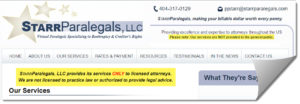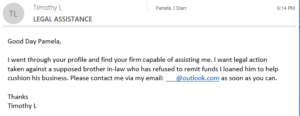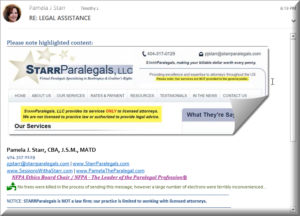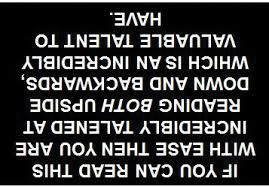So You Think Messenger is ‘Secure’?
January 30, 2019I’ve reluctantly participated in group & personal conversations on Messenger in which private, quasi-confidential information was shared. I tried to convince my friends/colleagues that Messenger was probably not the best platform for certain discussions because I believed it wasn’t secure. After all, it’s owned by Facebook; a platform that has admitted it mines and shares data.
It isn’t rocket science!!
You’ve seen it for yourselves – you Google something or make an online purchase and instantaneously you’re bombarded with ‘related’ ads on FB and Google/webmail sidebars. Your information is being monitored, mined, & sold.
They insisted it was as secure as any similar app – which isn’t saying much! – and it’s so much more convenient than opening a separate app when Messenger & FB were already loaded and live on their phones.
Okay, I get it. I’m old – the anti-millennial. My laptop is command central and where I feel most productive. I like my real, clackity, full-size keyboard and multiple monitors with screens that can be read without pinching or swiping. I don’t want to use my cellphone like a handheld computer for everything. I prefer to use it for calls & texts and to take & upload pictures.
Sure, I have all the apps on my phone – I’ve been through too many computer crashes, Internet/power outages, and freak acts of nature to trust any single device … but that’s a different rant.
Ultimately, I gave in. There are only so many windmills at which to tilt and I have bigger dragons to slay. Like convincing professionals and individuals to use for fee email and providers not the free versions because they don’t comply with the minimum standards set by the ABA regarding confidentiality and similar issues.
But I digress, this is meant to be about Messenger and the Facebook Police …
I was chatting with a colleague in Messenger – I never said I was perfect. I do my best to be aware and cautious. She was letting me vent about sheeple who query the FB community for answers but can’t be bothered to do any research for themselves.
We joked about how many times we’ve wanted to post, “Just Google it for yourself!” C’mon, it’s not that difficult. So I typed a reply …
“Did you know someone owns the URL justfuckinggoogleit.com and directed it to Google?”
I hit Send.
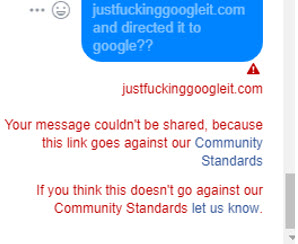
justfuckinggoogleit.com
My friends, if Messenger is so secure how did the Facebook Police kill my message?
That’s right!!
FB-bots read our private, ‘secure’ conversation and decided justfuckinggoogleit.com goes against their Community Standards!
What standards?? I’ve typed the “F” word in my fair share of messages & posts and shared questionable FB posts/pages/groups & Interweb links with nary a word. I even reported a direct threat and the FB braintrust told me it didn’t violate their terms.
Why this time?
What other information has FB mined from ‘private’ conversations?
Where did that information go?
STOP right there!
DON’T you dare toggle to Facebook to post a useless, ridiculous, space-wasting declaration ‘forbidding Facebook to disclose, copy, distribute, or take any other action against you based on your profile and/or its contents.’ I will stop following or unfriend you.
Read here if you still don’t understand why:
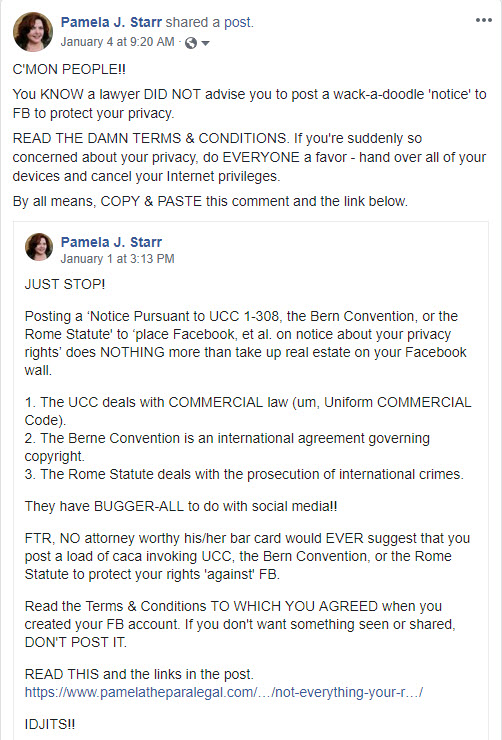
THINK! You have a brain, use it!
You control what, how, and where you share.
What Part of “ONLY Licensed Attorneys” Don’t You Understand?
May 7, 2018My company, StarrParalegals, provides paralegal support to attorneys PERIOD.
A simple concept, that is until I realized people have developed ‘selective reading’. It’s a bit like selective hearing. You know, the way a parent doesn’t hear, “Mommie!!! Mommie!!! I WANT THIS!” Or an attorney doesn’t hear repeated reminders of upcoming deadlines and bar dates 😉
Why is this an issue? Because non-lawyers keep wasting my time – constant calls from folks that “don’t really need an attorney” or “just want to ask a simple question” or who dive straight into the facts of their case despite the loud repetition of my mantra: “I’m sorry, we can’t help you. We only work for attorneys. If you’re not an attorney, we can’t help you.”
They even ignore the outgoing message on my phone, “Thank you for calling StarrParalegals … if you’re not an attorney or representative of a law firm, we can’t help you. Please hang up; don’t leave a message …” (I need to re-record it, so please don’t call to check it out.)
Everyone claims they’ve ‘been to my website’.
Nu? DID YOU SEE THE DISCLAIMER AT THE TOP OF EVERY SINGLE PAGE??!!??
Well, uh, yeah, but …
Or better yet, “I didn’t actually go to your website. You just came up on Google, so I called.” (BULL CACA!)
And the emails … OY!! The emails!!
Really? Did you REALLY look? Did you READ THE WORDS?
Clue, buy you should.
Comments Off on What Part of “ONLY Licensed Attorneys” Don’t You Understand?#DontDiscussBusinessInPublicLikeThis
April 19, 2017Think, for a moment , about the last time you were at the grocery store, a mall, or in any public setting. Did you encounter people on their cellphones and having face-to-face conversations? What did you hear in passing?
, about the last time you were at the grocery store, a mall, or in any public setting. Did you encounter people on their cellphones and having face-to-face conversations? What did you hear in passing?
Me? I had just dropped off a prescription at the pharmacy in my local grocery store and decided to do a little shopping while it was being filled. Cart and shopping list in hand, I found myself trailing a meanderer who was more focused on her conversation than shopping. Normally, I would have zipped past her, but the aisle was crowded and she kept pausing – not to shop or compare prices. Oy, gott in himmel,[1] that would have been a blessing.
No, my friends, she stopped, every few steps, to emphasize some salient (salacious?) point. Did I mention she was on speakerphone? The subject of the conversation – words I shall never unhear – in graphically intimate detail … the tribulations with her current method of birth control, punctuated by her friend’s excruciatingly, descriptive observations and commentary.
Oh how I wished that a ‘cone of silence’[2] would drop soundly on her (or my) head.
When did we become so complacent and nonchalant about the most intimate details of our lives?
How did we lose the skill to self-censor our actions and suppress the things we say and share?
At what point did we allow technology to override our awareness of the where, when, and what of our speech and actions?
And what, you may ask, does my grocery store encounter have to do with our jobs, duties, and responsibilities as paralegals?
More than you might realize –
You’ve seen the news, reports, and posts about the impact of technology and social media on ethics and confidentiality. Perhaps you’ve read one or more ethics opinions on the subject. As paralegals, we must be mindful of the constantly changing landscape that is 21st century law and give proper consideration to the implications of those transformations within the walls of our offices – you know, the sanctum sanctorum where we adhere to the rules. We know what we should and shouldn’t do. Right?
Just in case, let’s review the rules …
We’ll start with NFPA’s Model Code of Ethics and Professional Responsibility and Guidelines for Enforcement. Ethical Considerations 1.5 sets the standard for confidentiality:
EC-1.5 (f) A paralegal shall not engage in any indiscreet communications concerning clients.
It is derived from Rule 1.6 of the ABA Model Rules of Professional Conduct – Confidentiality of Information. This rule defines a lawyer’s – and every paralegal’s – ethical duty to take reasonable measures to protect confidential client information from inadvertent or unauthorized disclosures. Paragraph (a) states, in part:
- A lawyer shall not reveal information relating to the representation of a client unless the client gives informed consent …[3]
In May 2012, the ABA Commission on Ethics 20/20 submitted a Resolution and Report on Technology and Confidentiality to the ABA House of Delegates with recommendations for significant changes to the Model Rules to conform with advances in technology. Subsequently, Rule 1.6 was amended to include the following paragraph, ostensibly in consideration of the effect of technology on the practice of law and to further clarify concerns about inadvertent or unauthorized disclosure:
(c) A lawyer shall make reasonable efforts to prevent the inadvertent or unauthorized disclosure of, or unauthorized access to, information relating to the representation of a client.
Are you taking notes?
Today, my esteemed colleagues, I’d like you to consider your role in the prevalence of inadvertent disclosure in the real world. Keep the thou shalt nots of the rules cited above in mind while you consider the ramifications and indirect consequences of your interactions once you leave the hallowed halls of your work places.
Let me share a true-life example courtesy of Jennifer Ellis, JD, a respected expert on social media and ethics.[4] On March 6, 2015, Jennifer live tweeted an entertaining, albeit unsettling, account of her observations while waiting for her car to be repaired:
- At a car dealer. Man is talking to his employee about a third employee. #badidea
- He is talking to a woman with the same first name as me, which caused me to notice.
- He gave Jennifer detailed information about how to log into their bank system. I heard the name of the bank and the passcode.
- #dontdiscussbusinessinpubliclikethis
- He is explaining his payroll issue. It seems there is an issue with the bank.
- He needs to pay his employees half in cash
- I could easily figure out who this guy is, where he works and the location of his safe with money in.
- He is confirming he has large amounts of cash in his safe.
- Now I know where they are meeting with a large amount of cash. He even provided detailed directions
- Now I know his full name.
- So to recap. I know name, bank, password (I forgot that immediately alas) that Dawn is in trouble. That he is buying a property.
- Where the property is. And that he will be carrying cash.
- I will not give in to the temptation to look up his name. Which I will forget very soon anyway. [5]
What happened to common sense? Did he really think no one would hear his conversation? One can only hope that, 1) other customers in that waiting room also chose to ignore temptation; and 2) no one in that room knew any of the named parties.
‘Fess up. You just had a ‘have I done that?’ moment.
Put your on paralegal suit and consider a typical day at work. You’ve settled in to perform your characteristic paralegal magic, and, SCENE:
- You’re in the elevator with co-workers talking about opposing counsel.
- You’re at lunch with colleagues when the conversation turns that PITT (“Pain in the Tuchas”) client.
- You’re driving home from work and you call your BFF (hands-free connection, of course) to whine about your day.
- You’re in line somewhere, phone in hand, checking office email or texting a colleague.
- You’re at the park on the phone discussing trial details with your supervising attorney.
- You’re on the train, a plane, or in some very public waiting area working on your tablet or laptop.
- You’re at a professional event comparing war stories.
- You’ve posted a hypothetical to an online forum on Facebook, LinkedIn, an ‘old school’ listserv, or discussion board.
If you’re first thought is, ‘she can’t be serious’. You’re wrong.
Remember EC 1.5 (f)? “A paralegal shall not engage in any indiscreet communications concerning clients.” [emphasis added]
What about Rule 1.6 (a) and (c)? For additional insight and guidance, we look to the comments to Rule 1.6, specifically as they apply to paragraphs (a) and (c).[6]
Comment 4 expands the application of Paragraph (a) – the rule that ‘prohibits a lawyer from revealing information relating to the representation of a client.’ According to Comment 4:
This prohibition also applies to disclosures by a lawyer that do not in themselves reveal protected information but could reasonably lead to the discovery of such information by a third person. A lawyer’s use of a hypothetical to discuss issues relating to the representation is permissible so long as there is no reasonable likelihood that the listener will be able to ascertain the identity of the client or the situation involved. [emphasis added]
Comment 18 elaborates on Paragraph (c)’s requirement that ‘a lawyer make reasonable efforts to prevent the inadvertent or unauthorized disclosure of, or unauthorized access to, information relating to the representation of a client.’ In significant part, Comment 18 explains that a lawyer is required:
… to act competently to safeguard information relating to the representation of a client against unauthorized access by third parties and against inadvertent or unauthorized disclosure by the lawyer or other persons who are participating in the representation of the client or who are subject to the lawyer’s supervision. See Rules 1.1, 5.1 and 5.3. … Whether a lawyer may be required to take additional steps to safeguard a client’s information in order to comply with other law, such as state and federal laws that govern data privacy or that impose notification requirements upon the loss of, or unauthorized access to, electronic information, is beyond the scope of these Rules … [emphasis added]
In short, we’re bound by the rules to be discreet to avoid inadvertent or unauthorized disclosure. Although the rules seem to place more emphasis on electronic mishaps and that which occurs within the office, I submit that rules extend to the spoken word and the manner in which we conduct ourselves outside the office … at all times.
- With the rules in mind – what considerations should have been made regarding the above scenarios?
- ‘The elevator’ – Were you the only occupants at the time? Did someone board the elevator while you were in mid-conversation? Is there a chance that OC or the other party has offices in your building and someone overheard your conversation? How much did you say and in what context? From an alternative perspective, you’re alone on the elevator when some attorneys from another firm, in the midst of a heated discussion about a settlement agreement, join you. As far as they’re concerned, you’re invisible.
- “At lunch” – Who can hear you? If you think the answer is, ‘It was noisy, no one could hear us.’ You’re wrong. You heard each other, didn’t you? How specific were your comments? Did you name names or other details about the case?
- “Driving home” – Granted, you’re alone in your car and your BFF doesn’t even work in a law related industry. How could there be an issue? Did you rant about a colleague or client, or discuss the details of a file you’re working on?
- “In line” – I bet you’re thinking, it’s a tiny screen. Who would take the time or energy to read over my shoulder? Does it really matter? A friend recently told me she’d been able to clearly see some random guy’s entire text conversation while she was sitting inside a coffee shop and he was sitting outside merrily texting along.
- “At the park” – Who was around you? Did it occur to you to mention where you were or suggest that you would call back when you were in a more secure location? How detailed was your conversation?
- “On the train …” – Was it a secure Wi-Fi connection? What about your screen? Could anyone look over your shoulder and read that pleading your drafting? Maybe it’s time to invest in a VPN and privacy screen protector.
- “At a professional event” – This one should be obvious. The attendees are about as diverse a group as you can get and you’re in public (semi-private doesn’t count). Unless you’re speaking in Enigma level code, it’s likely you’re unintentionally giving away the proverbial farm.
- “Posting to a forum” – How often have you read and responded to questions posted by other paralegals requesting information or clarification on a situation? Or perhaps you’ve posted your own query – how well disguised was your hypothetical? Did you take time to consider that someone from the other side might be a member of the group – lurking in the background? Did you disclose information by way of an innocent inquiry? Did you commit UPL??
These things happen every day and we often let them pass without a second thought.
How much identifiable or confidential information have you inadvertently disclosed?
This is no joking matter!
Think before you speak, type, text, send, post …
Reprinted by permission from The National Federation of Paralegal, Associations, Inc., www.paralegals.org.
[1] Loosely translated from German as “good heavens”
[2] Get Smart (TV Series 1965–1970)
[3] Rule 1.0(e) “Informed consent” denotes the agreement by a person to a proposed course of conduct after the lawyer has communicated adequate information and explanation about the material risks of and reasonably available alternatives to the proposed course of conduct.”
[4] http://www.jlellis.net/blog/ – @jle_jd
[5] I have redacted a significant number of posts from the original, 1-hour feed.
[6] Model Rules of Professional Conduct Comment on Rule 1.6, http://www.americanbar.org/groups/professional_responsibility/publications/model_rules_of_professional_conduct/rule_1_6_confidentiality_of_information/comment_on_rule_1_6.htm
2 CommentsComputer Twilight Zone
July 7, 2016I was happily composing a response to a client when, flicker … flip.
That’s right, FLIP!
My laptop display reappeared upside-down and backward, as if it had entered a da Vinci twilight zone.
- Coffee … check.
- Ground below, sky above … check
Don’t Panic!!
I hadn’t, to my knowledge, encountered a wormhole or stepped through a looking glass. And, no, the laptop shouldn’t have a rotating display. It’s a basic, 6 lb., sits on my desk, no touchscreen, laptop.
I picked up my netbook, turned it on, – breathed a huge sigh of relief when it opened in normal, landscape orientation – and Googled, ‘WTF? My laptop display is upside-down!‘
Alrighty then. According to the brain trusts at several fora, including HP and Microsoft, it’s a simple fix: Ctrl + Alt + up arrow.
Easier said than done! Have you ever tried to drive your mouse or use a touchpad in a carnival fun house? It was all catawampus!
I figured since I’m already left-handed and dyslexic, it would be easy(ish) to do. I failed to figure in that, although I write with my left hand, I use a mouse like a ‘normal’ right-handed person.
My poor, addled brain couldn’t quite master the inversion-conversion required to mouse upside-down and backward.
No worries; I’ve got this.
I picked up and flipped the laptop. Now the keyboard was upright and facing me and the display was on the desk.
Ctrl + Alt + up arrow. Flicker. Fixed.
NOT!
I was back in da Vinci land as soon as I clicked the mouse.
Back to the netbook. Oh, look, there’s a whole series of ‘thanks for nothing; it flipped back’ posts.
Well, isn’t that special?!?!
New fix:
- Control Panel
- Display Resolution
- Landscape (not flipped)
- Uncheck ‘Auto Rotate’
- Apply
- Pray
So far, so good. Still, it would be nice to know WTH happened in the first place!
And back to work I happily plod.
Not Everything Your Read on Facebook is True
July 5, 2016Reality check …
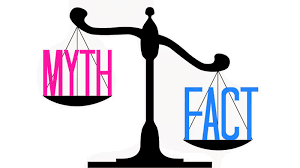 Even if there were ANY truth to the recurring rumors (that’s right myths, BS, blatant nonsense) about Facebook ‘going public’ or ‘charging for access’, or my all time favorite, that social media users have some right to protection under UCC-anything, do you honestly believe Facebook would be monitoring your pages for posts in which you attempt to invoke rights that you signed away as soon as you created your Facebook account???
Even if there were ANY truth to the recurring rumors (that’s right myths, BS, blatant nonsense) about Facebook ‘going public’ or ‘charging for access’, or my all time favorite, that social media users have some right to protection under UCC-anything, do you honestly believe Facebook would be monitoring your pages for posts in which you attempt to invoke rights that you signed away as soon as you created your Facebook account???
Want to know more? Read my posts from November 2012:
- Social Media & UCC 1-308 ‘Privacy Notice’
- Copyright, the Berne Convention & Social Media
- Privacy Notices – Part 3








